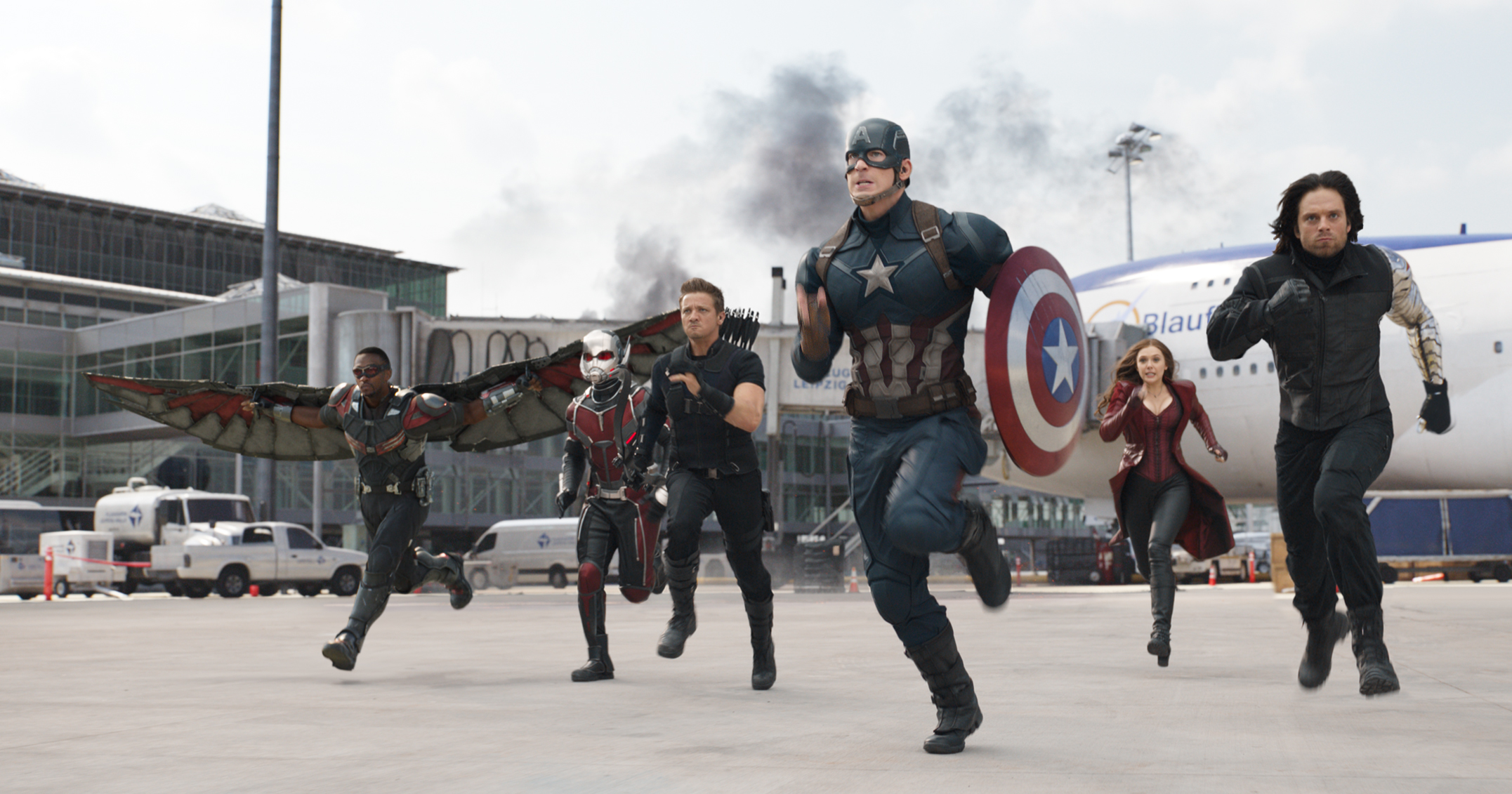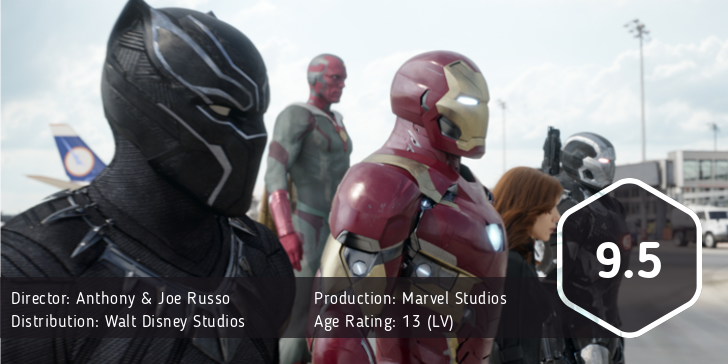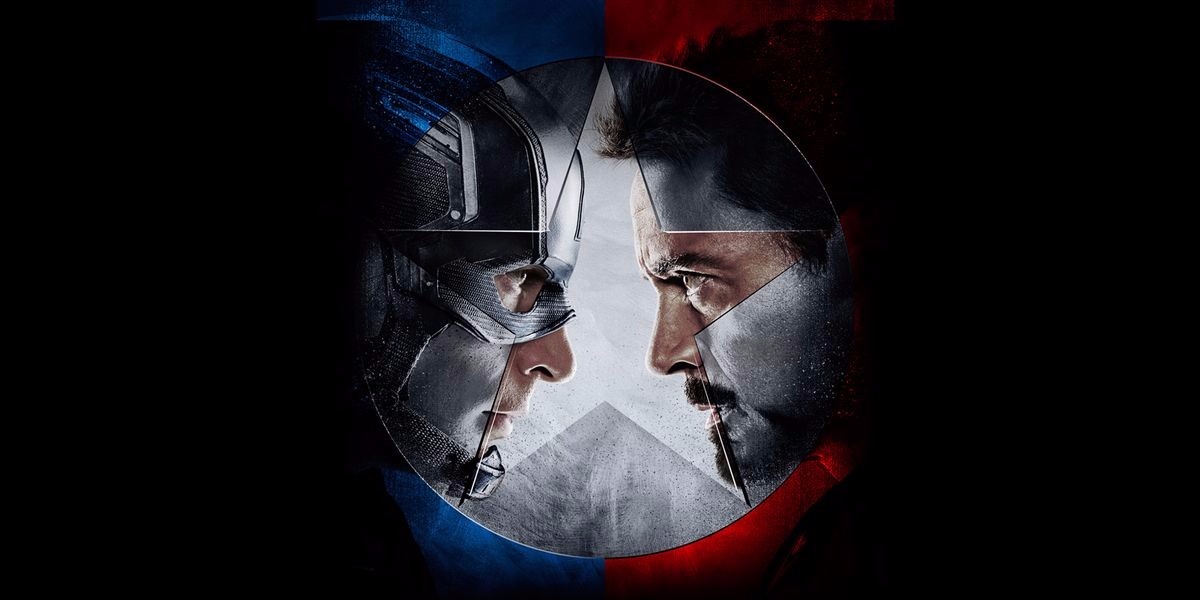It’s time for Captain America, Iron Man, and the rest of the Avengers to get back in action with Captain America: Civil War, and this time they’re fighting among themselves. Of course, the Avengers alone couldn’t carry more than a scenery-destroying barroom brawl, so they’ve brought some friends along for the fight. Let’s dive into the brawl for this review. Last one in’s a rotten egg.
The film loosely follows the events of the comic story Civil War, and follows on a year after the events of The Avengers: Age of Ultron. Very mild spoilers follow here, so feel free to skip to the next paragraph if you want to know nothing about the plot. After a bomb goes off in the African nation of Wakanda, the United Nations pools together to deem all superpowered people a threat that must be managed at government level. Tony Stark agrees with this sentiment, and tries to convince the Avengers to sign the accord. Captain America disagrees, and at the center of the fight is James “Bucky” Barnes, the Winter Soldier and Captain’s friend. Each side gathers their allies for one of the biggest fight-offs in superhero film history.

Naturally, the story in the film deviates quite a bit from the comic. For one thing, the comic wasn’t a Captain America headline, and the film’s title, despite headline the Cap himself is actually still very clearly an Avengers film. The term Civil War refers to the strife within the Avengers, and not quite an all-out war as depicted in the comics. Basically, anyone hoping for the spectacle that the comic story was is going to be disappointed. This film also acts a vehicle for introducing the character of Black Panther.
The usual gamut of actors return to reprise their roles for Captain America: Civil War, but it’s a very different Avengers that we are faced with: Captain America, Falcon, Scarlet Witch, Black Widow, and Vision. As the trailer so firmly showed, the film also finally introduces Spider-Man to the MCU. The best thing about his introduction? No damned Uncle Ben, no big spider bite explanation, no rehashing of tired old territory. It was brilliant.We’ve become so used to the Avengers regulars that it was actually refreshing to see Ant-Man and Black Panther show up. Thankfully, the number of new arrivals isn’t so much to be overwhelming, but just enough to be fresh. Speaking of Black Panther, the actor Chadwick Boseman speaks a passable Xhosa, despite his character T’Challa being from fictional Wakanda (allegedly near Uganda, if the map shown in the film is to be believed). It’s funny how the fictional conceit is ruined because you happen to recognize the language being spoken.

As far as the story and action goes, it was possibly one of the most adult stories I’ve seen in a superhero film, and I don’t say that lightly. Superhero films are not precisely known for their emotional depth when exploring the human condition. The rift that forms between Stark’s faction and Rodgers’ faction happen for intensely human reasons. For Stark, it’s about responsibility and trying to reduce the destructive effects a super-powered battle has on an urban setting. This is highlighted in the film as “footage” taken from the first two films showing the destruction of New York and of Sokovia (and no mention of the crazy destruction caused in Johannesburg by Hulk and Iron Man’s epic fight!) For Rodgers standing on the other end of the spectrum, it’s about having the freedom to act against evil without being shackled by governments who might have counteractive agendas at play, or who might not understand the full ramifications of what’s happening. Both of them are right in different ways, which means it’s difficult for us as an audience to pick a side. What’s fully frustrating is their inability to come to some sort of compromise, and you feel this emotion coming through in the film. Of course, we still applaud the fights, but I think the story attempts to highlight just how a war happens, how innocent bystanders are sucked into supporting one side or the other and ignoring the greys of the arguments in between.

Still, as a superhero film, Captain America: Civil War is an enjoyable spectacle, with plenty of action and explosions to keep the younger audience members entertained; be warned though, the film contains a fair amount of bad language. Not f-bombs every two minutes, but enough expletives to make you keep the very young away from it.
It’s not a great movie for someone going in as their first MCU film, because it relies so much on the foundations built up in prior films such as the prior two Avengers film, Ant-Man, Iron Man, and naturally, the prior two Captain America films. It’s also partially dependent on you having watched, or at least been aware of, the Agents of S.H.I.E.L.D. and Agent Carter television shows. Naturally, there are primers online that will help you understand what you need to before seeing this film but nothing beats a good bit of personal experience with the films. That’s still a lot of watching just to get the most out of this film. And it’s going to get worse, because if you haven’t watched this film, you’ll be lost when the Black Panther film hits next year, and then there are still the next Avengers films in line, the upcoming Spider-Man film, Doctor Strange, Guardians of the Galaxy 2…

Should you watch Captain America: Civil War? If you’re a fan the MCU films, this is a no-brainer. Go see it. If you’ve watched the prior films and want to watch the upcoming films and understand where they fit into the framework, this is an essential piece. I’m fairly sure the concept of superhuman registration is going to come up again. It’s big, it’s world-spanning, and it’s loud. If you’re not familiar with the prior movies and TV shows, you might be a bit lost, but it’s difficult to tell just how lost you’d be. If you’re one of these poor souls who goes to see it without knowing much about the older stuff, let us know in the comments below how it worked out for you?

All images ©2016 Marvel



1 reply on “Film Review: Captain America: Civil War”
Great article. Black Panther’s mother was South African in the comics. So it’s not completely implausible. Though I would’ve wanted them to speak an East African language at least, even Swahili would’ve been okay. It did feel like typical Hollywood, collapsing “the darkest continent” into 1 mass of language.